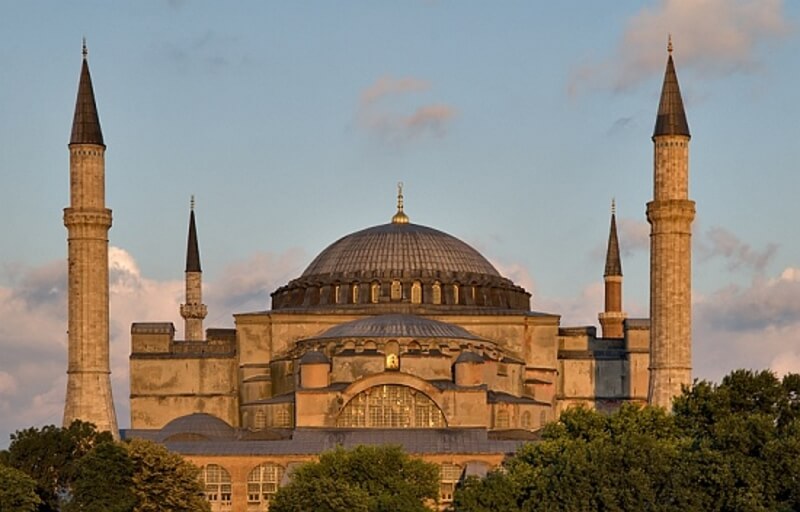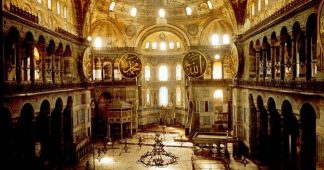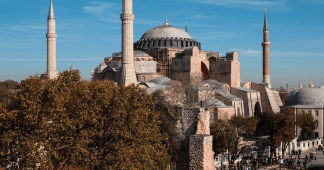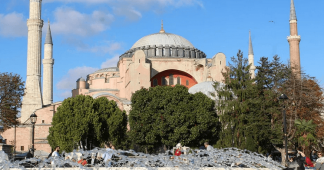By Dimitris Konstantakopoulos
The decision of the Turkish regime to make Hagia Sophia, one of the most important monuments of Christendom, a mosque can only be considered as an unacceptable attack on culture and civilisation. Of course, no one can deny to modern Turkey, if its people want it, (something that is not at all certain), the right to become as “Islamist” as it wishes, abandoning the tradition of its founder Kemal Ataturk. But it can do so by building and honouring its own monuments and places of worship, not by using monuments and places of worship built by others. One also wonders why the Turkish elite seems to believe that it helps the prestige of their country to recall every now and then, in the year 2020, the conquest of the capital of the Byzantine Empire in 1453. Anyway, if there is one thing that humanity needs more than anything today, in so difficult a situation, it is the tolerance and respect of one nation for another, of the followers and representatives of each religion for the others. This is a one of the main criteria for the civilisation of every human being and of every people.
For whatever reason Mr. Erdogan made such a decision, it certainly reflects the ideology and perceptions of the pan-Islamist and neo-Ottoman tendencies in his environment, such as those expressed by the SADAT organization, which competes with the neo-Kemalists and Eurasianists in influencing Turkish politics. These tendencies consider extremist Islamism to be the solution, imply that Erdogan is the new Prophet (“Mahdi”), and aim, whether they really believe it or say it just for propaganda, to create a great Sunni “confederacy”, behind which one can easily distinguish a variant of a new “Ottoman Empire”.
These plans are completely outrageous, lack seriousness and are impossible to implement. Any attempt to implement them will inevitably provoke the mobilisation against Turkey of the Arabs, the Greeks, the Iranians, the Russians and the Shiites. But, as long as they inspire the ideologies and policies of the Turkish state, these grandiose plans, while impossible, produce significant international political results:
“War of Civilisations”
First, they reinforce the “war of civilisations” policy pursued by the most dangerous and revisionist forces in the world, that is, those responsible for the chain of unending wars in the Middle East, the forces revolving around Huntington’s ideas and expressed by politicians such as Pompeo, Bannon, Netanyahu, etc. They want to push the Islamic world into an aggressive and backward Islamist policy, in order to unite the western nations around their war plans. This, after all, has been a basic policy of Western colonialism in the Arab-Muslim world for at least a century, from the time the British forbade Egyptian girls to go to school and starred in the creation of the Muslim Brotherhood, up to Afghanistan and ISIS. By the way it would be useful for Ankara and everybody else to think on the motivations behind the approval by Jonshon’s Britain of the decision concerning Hagia Sophia. It was Britain which participated enthusiastically in the Iraqi invasion and all the other western interventions in the Middle East.
The irony of the story is that these forces, the Neoconservatives, the “War of Civilizations” party, were directly responsible and behind the failed coup against Erdogan himself!
Difficult alternatives
It is worth noting, in this respect, the difficulties faced by regimes that, at some point, are forced into conflict with Western imperial centres, but find it difficult to complete the rupture with them, insofar as they do not have a great programmatic answer, but also seek to remain within the system of “financial globalisation”, which is dominated by the Empire of Finance. Unable to speak, like Hugo Chavez, of “21st century socialism”, Erdogan, even if at one point he came to recite the great Turkish and communist poet Nazim Hikmet to his gathered followers, apparently he is not wishing to break completely with the West and he is doomed, given also his political origins, to turn to Islam for legitimacy and political power.
Pushing Turkey to “overextend”
Second, the neo-Ottoman conceptions bring Turkey itself into conflict with the Arabs, the Greeks and the Russians, if not Iran, and therefore facilitate precisely the forces that want to push Turkey into “over-expansion” , in “adventures” that it will not be able to carry out, in order to destroy its “independence” ambitions, to overthrow Erdogan if possible and to replace him with an authoritarian but Western (and Israeli) controlled regime.
One suspects that this is exactly what motivates those who have pushed President Trump to send encouraging messages to Erdogan regarding Libya and Syria, while it is not at all certain what messages he receives from the American President concerning Greece. In other words, they probably want to create a misconception of security in the Turkish President and lead him to steps that will potentially destroy him, after destroying as much as possible his relations with Russia and everybody else, a classic method that has been used many times in history, with more typical examples in recent decades, for example Saddam in Kuwait and Milosevic in Kosovo.
Mr. Erdogan should normally, after the adventures of 2016, know that he is not accepted by the main western centres and that they will overthrow him as soon as they have such an opportunity, something that becomes apparent by simply reading all the reports of American think tanks (look for example Difficult ally or Eurasian enemy? Turkey in the eyes of American think tanks)
Third, Erdogan’s decision and neo-Ottoman ideas add new “explosives” to Greek-Turkish relations which are now moving on a very dangerous trajectory, with the possibility of war between the two countries, a war that is not certain to be limited to a hot “episode” and which , if it happens, may have catastrophic consequences for both countries, given the weapons at their disposal. There will be no winner in such a conflict.
In our next article we will examine this scenario and the tremendous repercussions it may have not only for Greece and Turkey, but also for the EU, China, Russia and the world situation.
Also read
What Will Happen Now to Hagia Sophia’s Byzantine Mosaics?
World reacts to Turkey’s decision to re-convert Hagia Sophia into mosque
Why the U.S. will do nothing to protect the Hagia Sophia
Official UNESCO Statement on Reconversion of Hagia Sophia into Mosque
Hagia Sophia becomes mosque again after Erdogan signs decree









